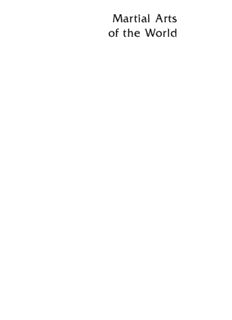
Martial Arts of the World: An Encyclopedia (2 Volume Set) PDF
Preview Martial Arts of the World: An Encyclopedia (2 Volume Set)
Martial Arts of the World Martial Arts of the World An Encyclopedia Volume One: A–Q Edited by Thomas A. Green Santa Barbara, California Denver, Colorado Oxford, England Copyright © 2001 by Thomas A. Green All rights reserved. No part of this publication may be reproduced, stored in a retrieval system, or transmitted, in any form or by any means, electronic, mechanical, photocopying, recording, or otherwise, except for the inclusion of brief quotations in a review, without prior permission in writing from the publishers. Library of Congress Cataloging-in-Publication Data Martial arts of the world: an encyclopedia / [edited] by Thomas A. Green. p. cm. Includes bibliographical references and index. ISBN 1-57607-150-2 (hardcover: alk. paper); 1-57607-556-7 (ebook) 1. Martial arts—Encyclopedias. I. Green, Thomas A., 1944– GV1101.M29 2001 796.8'03—dc21 2001002823 06 05 04 03 02 01 10 9 8 7 6 5 4 3 2 1 This book is also available on the World Wide Web as an e-book. Visit abc-clio.com for details. ABC-CLIO, Inc. 130 Cremona Drive, P.O. Box 1911 Santa Barbara, California 93116-1911 This book is printed on acid-free paper I. Manufactured in the United States of America Contents Editorial Board, ix Contributor List, xi Introduction, xv A Note on Romanization, xix Martial Arts of the World: An Encyclopedia Volume 1: A–Q Dueling, 97 Africa and African America, 1 Europe, 109 Aikidô, 12 External vs. Internal Chinese Animal and Imitative Systems Martial Arts, 119 in Chinese Martial Arts, 16 Archery, Japanese, 18 Folklore in the Martial Arts, 123 Baguazhang (Pa Kua Ch’uan), Form/Xing/Kata/Pattern Practice, 23 135 Boxing, Chinese, 26 Boxing, Chinese Shaolin Styles, 32 Gladiators, 141 Boxing, European, 44 Gunfighters, 149 Brazilian Jiu-Jitsu, 52 Budô, Bujutsu, and Bugei, 56 Hapkidô, 157 Heralds, 162 Capoeira, 61 China, 65 Iaidô, 169 Chivalry, 72 India, 173 Combatives: Military and Police Martial Art Training, 83 Japan, 179 v Japanese Martial Arts, Chinese Volume 2: R–Z Influences on, 199 Rank, 445 Jeet Kune Do, 202 Religion and Spiritual Development: Jûdô, 210 Ancient Mediterranean and Medieval West, 447 Kajukenbo, 219 Religion and Spiritual Development: Kalarippayattu, 225 China, 455 Karate, Japanese, 232 Religion and Spiritual Development: Karate, Okinawan, 240 India, 462 Kendô, 249 Religion and Spiritual Development: Kenpô, 255 Japan, 472 Ki/Qi, 260 Knights, 263 Sambo, 507 Kobudô, Okinawan, 286 Samurai, 514 Korea, 291 Savate, 519 Korean Martial Arts, Chinese Silat, 524 Influences on, 299 Social Uses of the Martial Koryû Bugei, Japanese, 301 Arts, 532 Krav Maga, 306 Southeast Asia, 538 Kung Fu/Gungfu/Gongfu, 313 Stage Combat, 551 Stickfighting, Non-Asian, 556 Masters of Defence, 317 Sword, Japanese, 564 Medicine, Traditional Chinese, 327 Swordsmanship, European Meditation, 335 Medieval, 570 Middle East, 338 Swordsmanship, European Mongolia, 344 Renaissance, 579 Muay Thai, 350 Swordsmanship, Japanese, 588 Swordsmanship, Korean/Hankuk Ninjutsu, 355 Haedong Kumdô, 597 Okinawa, 363 T’aek’kyo˘n, 603 Orders of Knighthood, Taekwondo, 608 Religious, 368 Taijiquan (Tai Chi Ch’uan), 617 Orders of Knighthood, Thaing, 629 Secular, 384 Thang-Ta, 637 Training Area, 643 Pacific Islands, 403 Pankration, 410 Varma Ati, 647 Performing Arts, 417 Vovinam/Viet Vo Dao, 651 Philippines, 422 Political Conflict and the Warrior Monks, Japanese/Sôhei, 659 Martial Arts, 435 Women in the Martial Arts, 664 vi Contents Women in the Martial Arts: Britain Wrestling and Grappling: Japan, 727 and North America, 684 Wrestling, Professional, 735 Women in the Martial Arts: Written Texts: China, 745 China, 689 Written Texts: India, 749 Women in the Martial Arts: Written Texts: Japan, 758 Japan, 692 Wrestling and Grappling: China, 705 Xingyiquan (Hsing I Wrestling and Grappling: Ch’uan), 775 Europe, 710 Wrestling and Grappling: India, 719 Yongchun/Wing Chun, 781 Chronological History of the Martial Arts, 787 Index, 839 About the Author, 895 Contents vii Editorial Board D’Arcy Jonathan Dacre Boulton Associate Professor of History, University of Notre Dame; medieval nobility and feudalism; The Knights in the Crown: The Monarchical Orders of Knighthood in Late Medieval Europe, 1326–1520 (1987). John Clements Director, Historical Armed Combat Association; reconstruction of European martial traditions for use as martial art; Medieval Swordsmanship: Illustrated Methods and Techniques (1998), Renaissance Swordsmanship: The Illustrated Use of Rapiers and Cut-and-Thrust Swords (1997). Karl Friday Professor of History, University of Georgia; early Japan, Japanese military insti- tutions and traditions; Hired Swords: The Rise of Private Warrior Power in Early Japan (1992), with Professor Seki Humitake Legacies of the Sword: The Kashima-Shinryû and Samurai Martial Culture (1997); current book project Samurai, Warfare and the State in Early Medieval Japan(Routledge, the Warfare in History series). Ronald A. Harris Ronald Harris and Associates; martial arts instructor in classic Filipino martial arts, Muay Thai, Boxe Francaise Savate, Taekwondo; numerous articles in Black Belt, Inside Kung Fu, and similar popular publications. Stanley E. Henning Assistant Professor, Asia Pacific Center for Security Studies, Honolulu; Chinese language and martial arts, Asian military history; numerous articles in scholarly journals. Keith Otterbein Professor of Anthropology, State University of New York at Buffalo; cross- cultural analysis of warfare, dueling, feuding; The Evolution of War (1970), ix Comparative Cultural Analysis (1972), Feuding and Warfare (1991), and The Ultimate Coercive Sanction: A Cross-Cultural Study of Capital Punishment (1986). Joseph R. Svinth Editor, Electronic Journals of Martial Arts and Sciences; martial arts history, cul- tural studies; Kronos: A Chronological History of the Martial Arts and Com- bative Sports, numerous articles in scholarly journals. Phillip Zarrilli Professor of Drama, University of Exeter, U.K.; India, performing arts, South Asian studies, folklore; When the Body Becomes All Eyes: Paradigms, Dis- courses, and Practices of Power in Kalarippayattu, a South Indian Martial Art (1998), Kathakali Dance-Drama: Where Gods and Demons Come to Play (2000); coauthor, Indian Theatre: Traditions of Performance (1990), Wilhelm Tell in America’s Little Switzerland(1987),The Kathakali Complex: Actor, Per- formance, Structure (1984); editor, Acting (Re)considered: Theories and Prac- tices (1995), Asian Martial Arts in Actor Training (1993). x Editorial Board
Description: